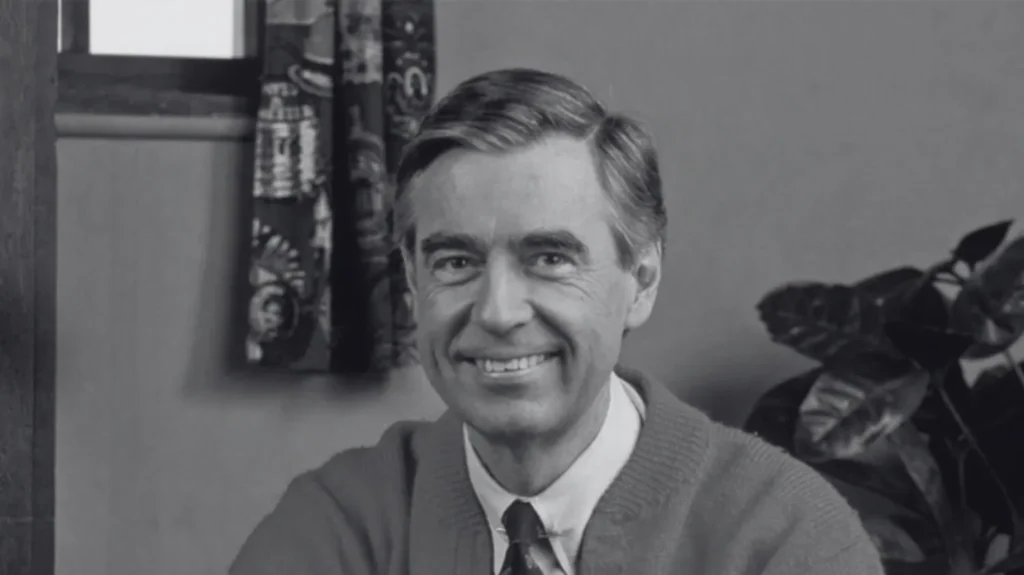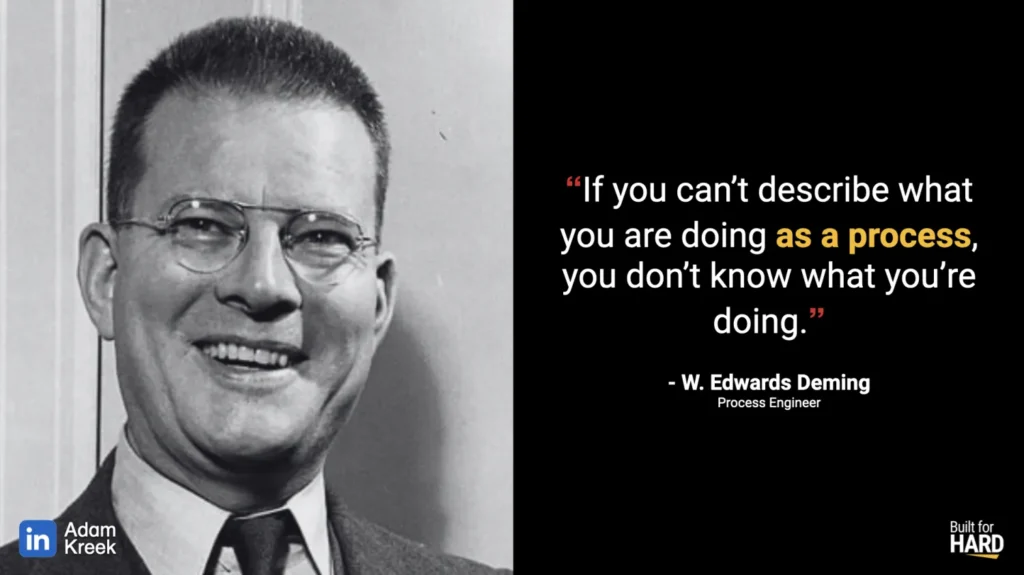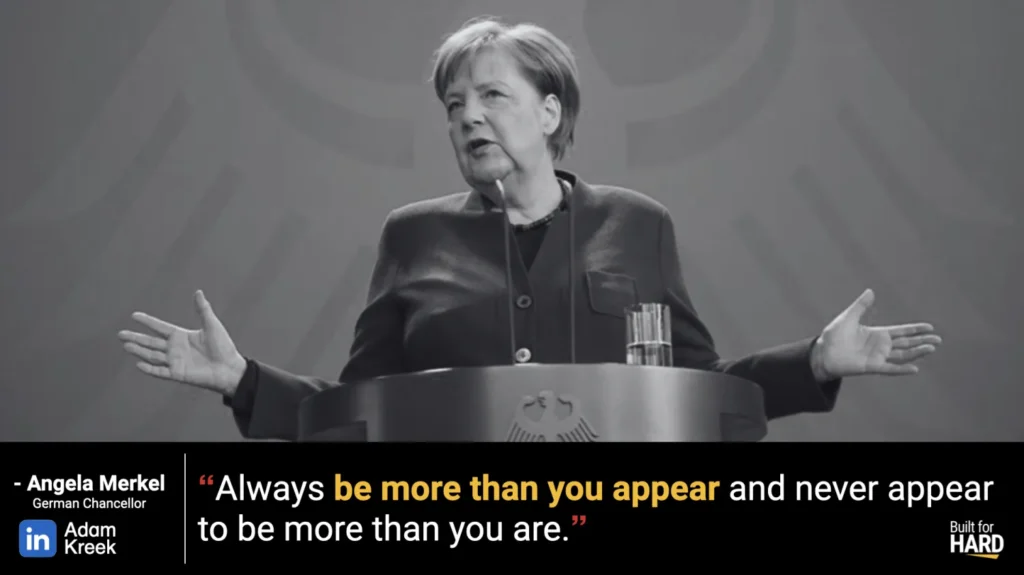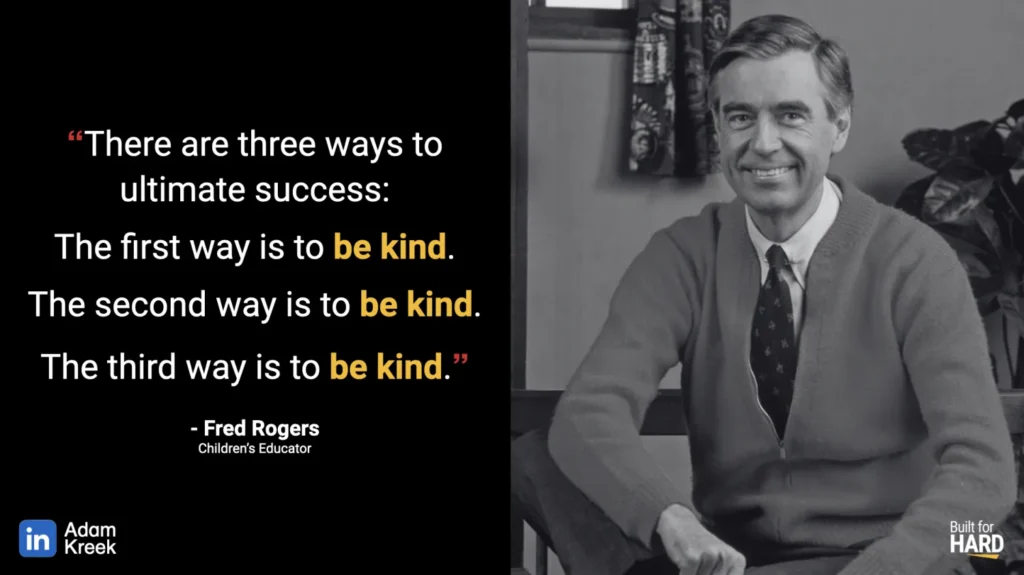
"There are three ways to ultimate success: The first way is to be kind. The second way is to be kind. The third way is to be kind."
Fred Roders
Children's Educator
- Date
If This Then That Referral Process for Structured Sales Pros
posted in Business Coaching

Adam Kreek
Great sales professionals come in all shapes and styles. Some thrive on improvisation and flexibility. Others thrive on clarity, predictability, and well-defined process. The real secret isn’t copying someone else’s preferred sales style. It’s understanding your own personality profile and building a system that aligns with who you actually are.
If you’re a collaborative, steady, precise sales professional (think Predictive Index profiles like Operator, Specialist, or Adapter), you already know the truth:
If the process fights your natural tendencies, you’ll feel friction, waste energy, and sabotage your own performance.
If the process fits your wiring, everything becomes easier, calmer, and more effective.
This matters especially when asking for referrals—a task that can feel uncomfortable without structure, timing, and a clear path.
Below is a proven If–Then–That referral call process designed specifically for:
- Steady, collaborative personalities
- Precise, high-C profiles
- Introverted but relationship-oriented sellers
- Operators who want to add value without being pushy
- Professionals who need a repeatable, confidence-building call flow
Highly flexible salespeople will glance at this and adapt it on the fly.
Highly structured professionals will use it as a backbone—then refine it as they go.
Both approaches are correct.
But for the precise sales pro, this structure creates comfort, clarity, and consistent results.

Why Referrals Matter (Especially for Steady, Trust-Based Sellers
High-dominant “hunter” sales personalities often power through cold outreach with adrenaline and improvisation. If that’s not you, cold prospecting can feel draining, unnatural, even misaligned.
Referrals allow:
- Warmth instead of cold calls
- Credibility instead of pressure
- Value conversations instead of pitches
- Long-term relationships instead of short-term wins
For Operator-style sales professionals, this plays directly into your strengths:
- You build trust over time
- You create steadiness and reliability
- You listen more than you talk
- You prefer substance over flash
- You deliver consistent value
Referrals are your superpower because they let your natural traits shine.

The If–Then–That Structured Referral Call Process
This system removes ambiguity, reduces emotional friction, and gives you a reliable path through the conversation.
Use it exactly as written or customize it for your voice.
1. Start the Call
IF they answer
THEN ask:
“Is now a good time for a quick call—five minutes? I can call later if needed.”
- IF yes → continue
- IF no → schedule and stop
2. Build a Brief Personal Connection
IF they have a moment
THEN make one relevant connection point:
“How did your event last month go?” or “How’s Q1 shaping up?”
- IF they open up → follow for 20–30 seconds
- IF they stay brief → match their pace
3. Ask About Their Event Pipeline
“What’s happening in your event world right now?”
- IF they share → ask one clarifying question
- IF not much is happening → normalize it and pivot:
“Totally get it—most planners are booking later this season. Here’s what I’m seeing…”
4. Share Value Trends
IF they give context
THEN share 1–2 useful insights about trends you are seeing (budgets, formats, leadership needs):
“The clients getting the best outcomes right now are doing X…”
- IF positive reaction → continue briefly
- IF neutral → compress and pivot
5. Explain Why Referrals Matter
IF the conversation is warm
THEN share the impact:
“I love the impact we create when the right speaker lands at the right event.
The audience wins, the client wins, the speaker wins.”
“And honestly—referrals are the lifeblood of this work.
When someone like you makes an introduction, success skyrockets.”
- IF positive → continue
- IF hesitant → reassure:
“No pressure—we only do referrals when they’re natural and helpful.”
6. Make the Referral Process Simple
IF they’re open
THEN outline the simplicity:
- You make a short email intro.
- I book a 20–30-minute Zoom.
- I add value fast—ideas, intel, clarity.
- If there’s a fit, great. If not, they still benefit.
- IF concerns → emphasize reputation safety:
“Your name stays strong because I’m never pushy.”
7. Ask for the Referral DirectlY
IF they seem comfortable
THEN ask:
“Is there one person you know who plans great events and would benefit from these insights?”
“Who’s the first name that comes to mind?”
- IF they give a name → ask for intro
- IF hesitant → offer:
“I can write the draft intro for you. Easy copy-paste.” - IF no → end warmly and leave the door open
8. Lock the Next Step
IF they agree
THEN say:
“Great—I’ll send a short follow-up email with the intro text.”
- IF they list multiple names → prioritize one
- Move on to follow-up
9. Follow-Up Email
Send same day:
- Thanks
- Draft intro text
- Value reminder
- Calendar link
- Optional credibility video/reel
Optional Variations
IF they’re very busy → compress:
- 30-second insight
- Direct referral request
- “I’ll send an email you can forward.”
IF they offer a referral immediately → jump to Step 7.
IF they want to talk later → schedule immediately.
Why This Works for Steady Personalities
If your Predictive Index profile is Operator, Specialist, Adapter, or anything low-dominance / low-extraversion / high-patience / high-precision:
- You excel at building trust.
- You prefer structured steps.
- You avoid over-assertiveness.
- You listen deeply and respond thoughtfully.
- You perform best when you know exactly what comes next.
This process isn’t about forcing a script.
It’s about giving your brain the sequence it needs to stay calm, grounded, and in control.
When you operate from your natural strengths, your calls feel smoother, you project more confidence, and clients experience you as reliable, steady, and value-driven.
And that makes referrals easier for everyone.

A Practical Script You Can Use Today
If you’re a steady, collaborative, precise sales professional, the goal is not to become someone you’re not. The goal is to use a structure that aligns with how you naturally build trust. That’s why the call process above works so well: it’s calm, predictable, value-driven, and rooted in relationship strength—not pressure.
Below is a full script version you can try on your next referral call. Use it as written, adapt pieces of it, or rebuild it into your own voice. The structure does the heavy lifting.
Referral Call Script (Structured, Steady, and Value-Driven)
1. Opening
“Hi ____, it’s ____. Is now a good time for a quick five-minute chat? If not, I can call later.”
If yes → continue
If no → “No problem at all. What time later today or tomorrow works better?”
2. Personal Connection
“Thanks. Before we dive in—how have things been on your end? How did your last event go?”
(Keep it brief. Match their pace.)
3. Ask About Their Pipeline
“I’d love to hear what’s happening in your event world right now. Anything big coming up this quarter?”
If they share:
“That makes sense. What’s the main outcome you’re aiming for at that event?”
If not much is happening:
“Totally get it—lots of planners are booking later this season. Here’s what I’m seeing…”
4. Share Value Trends
“I’m seeing a real trend toward _____. Leadership teams are asking for _____.
The clients getting the best outcomes right now are doing ____.”
5. Why Referrals Matter
“You know, one of the things I love most about this work is the impact we create when the right speaker lands on the right stage.
The audience wins, the client wins, and the speaker wins.”
“And honestly—referrals are the lifeblood of this work. When someone like you makes an introduction, success skyrockets.”
6. Describe the Simple Referral Process
“It’s super simple:
- You make a short email intro.
- I set up a 20–30-minute Zoom.
- I share insights and help them think through their event strategy.
- If there’s a fit, great. If not, they still get value.”
“Your reputation stays strong because I’m never pushy—my goal is to be genuinely helpful.”
7. Ask Directly
“Is there one person you know who plans strong events and would benefit from this kind of conversation?
Who’s the first name that comes to mind?”
If they give a name:
“Perfect—would you be open to making a short intro?”
If they hesitate:
“No worries—I can write a quick draft intro you can copy and paste.”
If no:
“All good. If someone comes to mind later, feel free to send them my way.”
8. Next Step
“Great—I’ll send you a short email with the intro text. Thanks again. I really appreciate it.”
–––––
Adam Kreek and his team are on a mission to positively impact organizational cultures and leaders who make things happen.
He authored the bestselling business book, The Responsibility Ethic: 12 Strategies Exceptional People Use to Do the Work and Make Success Happen.
Want to increase your leadership achievement? Learn more about Kreek’s coaching here.
Want to book a keynote that leaves a lasting impact? Learn more about Kreek’s live event service here.